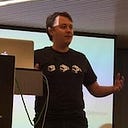Member-only story
2034: We Are Teaching Children With Obsolete Tools
How focusing too much on tools and less on fundamentals creates a paradox that hurts future students.

“I need a poster for my molecular biology project,” says Maria, sixteen, while preparing her breakfast. “I want it to show how cell reproduction works, with a scientific but modern style. The colors should be soft, and I need it to be easy for my classmates to understand.”
As she speaks, various versions of the poster appear in the air before her. With gentle gestures and precise words, Maria refines the design: “Make the arrows thinner… this text larger… change the background color to a warmer tone.” In less than five minutes, she has exactly what she was looking for.
Maria smiles, remembering her first-grade technology classes, when they spent hours learning to use Canva. “Drag this image here… Double click to change the text… Select this element to change the color…” Instructions that today sound as outdated as when her parents tell her about having to learn how to program the VCR to record a show.
This article is born from the experience in most of the schools in my country, Catalonia. In my country, there has been a great effort to improve the digital literacy of all students, from primary school through the last year of high school. A significant effort has been made, and today this effort is viewed as if we were teaching children to read. As if not being introduced to digital tools at an early age in school would leave them stranded in the world, unable to be independent, just as it used to happen with those who couldn’t read.
Digital literacy is now considered as fundamental as reading itself.
But unfortunately, it’s not being done right, we have focused too much on tools. So we find ourselves in the paradox that Maria’s fictional story introduces. We find that we are teaching children to use tools, tools that work according to today’s rules. But tomorrow, when it’s time to face the real world, this will have caused them to be less prepared for the world they will encounter.
And this is the paradox we find ourselves in, that despite dedicating more hours to learning…
